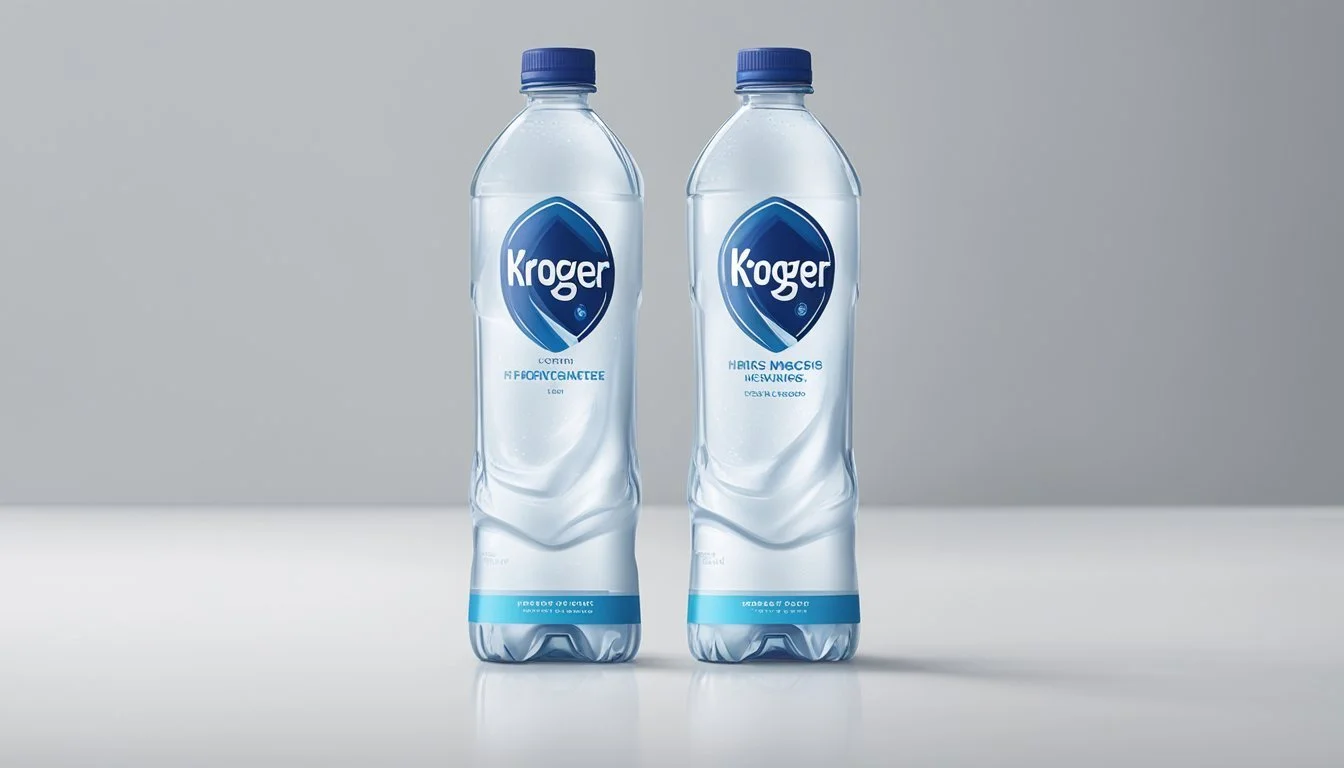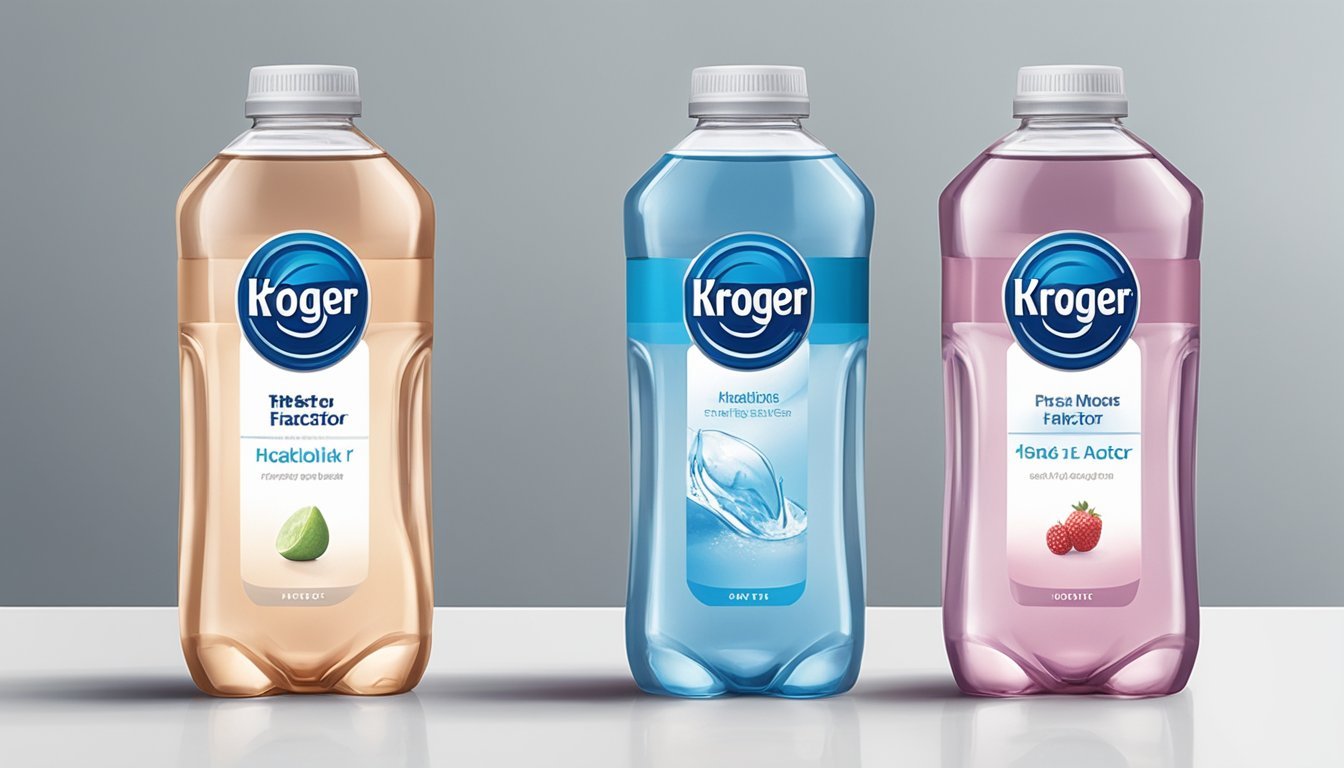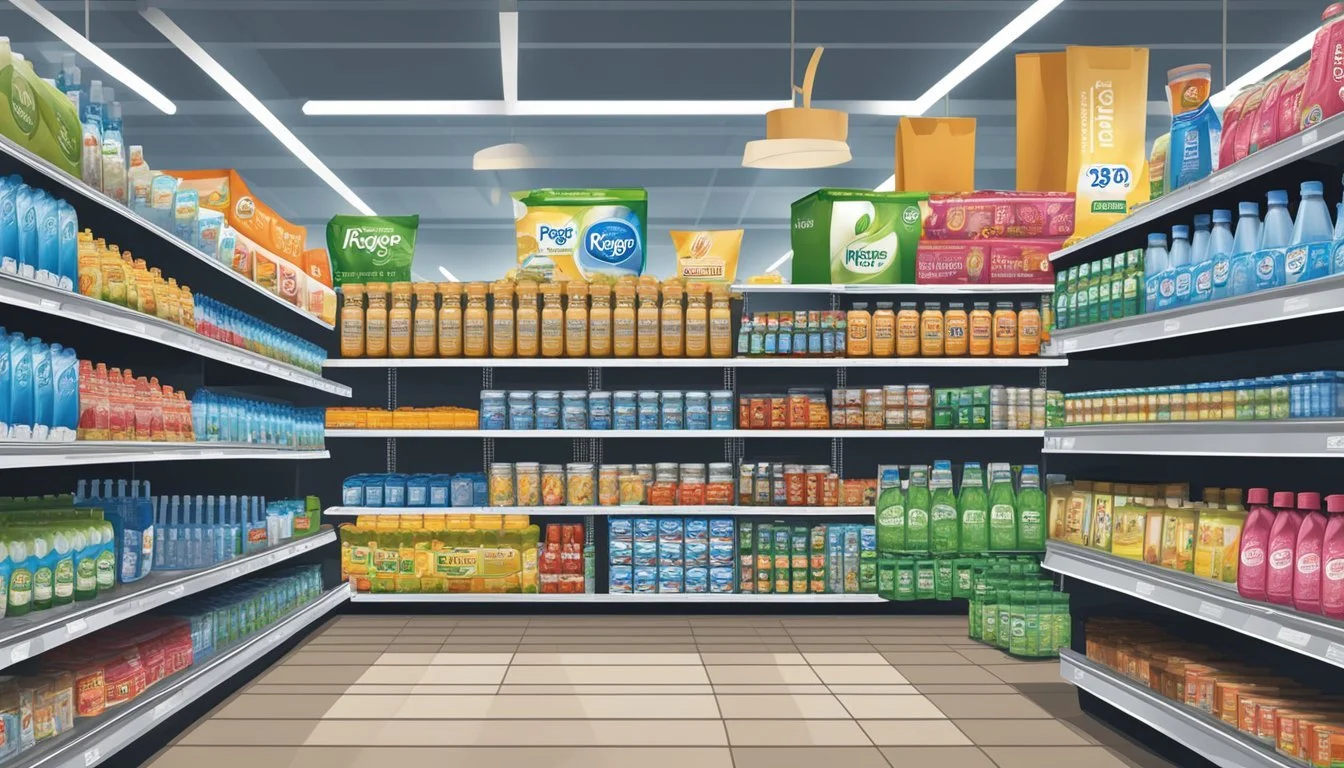Kroger vs. HFactor
Which Bottled Water Offers Superior Quality?
When it comes to comparing bottled water brands, many consumers are torn between Kroger and HFactor. Both brands have their unique characteristics, but one often outshines the other depending on various factors like taste, health benefits, and environmental impact. HFactor is often favored for its hydrogen-infused water, which many believe offers enhanced hydration and health benefits.
Kroger, on the other hand, is a more traditional choice and widely available, adhering to FDA regulations. The brand has made strides in ensuring the safety and quality of its water, yet concerns about contaminants and environmental impacts remain prevalent. For those prioritizing sustainability, the use of plastic bottles might be a significant drawback.
This comparison aims to shed light on what these two brands offer, helping you make an informed decision. Discover which bottled water truly stands out in terms of taste, health benefits, and overall value for your needs.
Understanding Bottled Water
Comprehending the essentials of bottled water involves recognizing the various types, the stringent regulations, and how it compares to tap water, along with the environmental consequences of its use.
Types of Bottled Water
Bottled water spans several categories like spring water, mineral water, and purified water. Spring water originates from an underground formation and flows naturally to the surface. Mineral water contains minerals and is typically sourced from springs, with strict restrictions on mineral content. Purified water undergoes processing to remove contaminants, offering a very high purity level. Different brands may offer distinct types, with companies like Nestlé and PepsiCo providing diverse options.
Regulations and Quality Reports
Bottled water is subject to rigorous regulations by the FDA, ensuring safety and quality. These regulations are sometimes stricter than those governing tap water, which falls under the EPA's jurisdiction. Brands must perform regular quality testing and maintain records. Reports often outline parameters like pH levels, contaminants, and compliance with legal limits. Recalls can occur when products fail to meet standards, emphasizing the importance of reliable quality reports for consumers.
Bottled Water vs. Tap Water
Comparing bottled water to tap water reveals key distinctions in regulations and quality control. Tap water, provided by municipal supplies, is regularly tested for contaminants like lead and must comply with EPA guidelines. Bottled water offers convenience and perceived higher purity. However, it can sometimes come from municipal sources and face recalls. While bottled water can be a safe alternative, tap water is usually sufficient for daily use and is more cost-effective.
Environmental Impact of Bottled Water
The environmental ramifications of bottled water consumption are significant. The production, transportation, and disposal of plastic bottles contribute to pollution and waste. Recycling rates for plastic bottles are low, exacerbating plastic pollution. Consumers and suppliers must consider sustainable practices, such as using BPA-free bottles and supporting recycling initiatives to mitigate these impacts. Evaluating the environmental footprint of bottled water underscores the need for responsible consumption choices.
Kroger and HFactor Brands Overview
Kroger is a well-established retailer offering a variety of bottled water products, while HFactor specializes in hydrogen-infused water with unique health claims. The following sections delve into the company profiles, brand philosophies, and market presence of each brand.
Company Profiles
Kroger is a nationwide grocery retailer headquartered in Cincinnati, Ohio. It operates nearly 2,800 stores across the United States. The company's bottled water products fall under its private label brands, including Simple Truth, which sources spring water from Michigan. Kroger’s bottled water adheres to FDA regulations to ensure safety and quality.
HFactor, founded by Gail Levy, is a company that produces hydrogen-infused water. Started with the support of former NBA player Barry Orms, HFactor positions itself in the niche market of wellness beverages. The company claims that its product can help with reducing inflammation and improving muscle recovery, targeting health-conscious consumers.
Philosophy and Brand Values
Kroger emphasizes accessibility and variety, aiming to meet diverse consumer needs with its extensive product range. The company prioritizes sustainability in its packaging, with many bottled water products now being BPA-free. Kroger's core values include quality, affordability, and environmental responsibility.
HFactor’s philosophy centers around wellness and innovation. The company was motivated by personal health experiences and is committed to pioneering the hydrogen water market. HFactor delivers its product in eco-friendly pouches instead of plastic bottles, aligning with its environmental consciousness. The brand values health benefits backed by scientific research and transparency.
Market Presence and Consumer Base
Kroger boasts a significant market presence in the U.S., with a broad consumer base that trusts its extensive range of products. The retailer's strong footprint allows it to offer competitive prices and frequent promotions, making its bottled water widely accessible.
HFactor has carved out a niche in the premium bottled water market. Its consumer base includes health enthusiasts and athletes, and the product has even garnered attention from celebrities. Although its price point is higher, HFactor justifies this with claims of health benefits and specialty packaging. The brand is growing but remains more exclusive compared to Kroger.
Quality Comparison
Understanding the quality of bottled water involves evaluating the water source, purification methods, mineral content, pH levels, safety measures, and compliance with regulations. This comparison highlights these factors for both Kroger and HFactor bottled water brands.
Water Source and Purification
Kroger sources its water from municipal sources, which often means tap water. It then undergoes a purification process, typically involving reverse osmosis and additional filtration steps, to remove contaminants.
HFactor claims to source its water from natural springs, which can offer a more pristine base. The purification process for HFactor includes reverse osmosis and hydrogen infusion. This additional method aims to enhance the water by adding hydrogen molecules, which are marketed for potential health benefits.
Mineral Content and pH Levels
Kroger bottled water generally has a mineral content similar to purified municipal water, which means it may lack the variety of natural minerals found in spring water. The pH levels are neutral, typically around 7.
HFactor water, because it comes from natural springs, contains a range of naturally occurring minerals such as potassium and magnesium. Its pH levels tend to be slightly alkaline, which some consumers prefer for taste and potential health benefits. The hydrogen infusion process doesn't significantly alter the pH but adds to the mineral complexity.
Safety and Contaminant Testing
Kroger adheres to safety protocols including testing for contaminants such as microplastics, heavy metals, and chemicals like BPA. The company ensures that their water meets federal and state safety standards.
HFactor also prioritizes safety through rigorous testing. This includes screening for contaminants like microplastics, heavy metals, and arsenic. The hydrogen infusion adds another layer of scrutiny, ensuring the safety and quality of the final product.
FDA Compliance
Both Kroger and HFactor comply with FDA regulations, ensuring their products are safe for consumption. Kroger's adherence means their bottled water meets all safety and quality standards set by the FDA.
HFactor also meets FDA guidelines, with additional certifications for its hydrogen infusion process. This compliance helps guarantee that both brands are reliable choices regarding regulatory standards.
In summary, while both Kroger and HFactor meet essential safety and regulatory requirements, HFactor's use of spring water and hydrogen infusion may provide additional mineral content and unique benefits compared to Kroger's purified municipal water.
Health Considerations
When comparing Kroger and HFactor bottled water, it's important to examine the nutritional profiles and benefits, the risks associated with contaminants, and their impacts on hydration and wellness. This ensures an informed decision based on health factors.
Nutritional Profiles and Benefits
Kroger bottled water typically offers basic hydration without added minerals or electrolytes. It adheres to FDA regulations for safety. HFactor, on the other hand, is marketed as hydrogen-rich water. This means it contains dissolved hydrogen, which some animal studies suggest may have antioxidant properties.
Hydrogen water enthusiasts claim it may help reduce inflammation and improve recovery times, but human studies are still limited. While Kroger water serves as a reliable hydration option, HFactor aims to provide potential added benefits, although scientific backing for its claims is still growing.
Risks Associated with Contaminants
Consumer concerns over bottled water often involve contaminants like microplastics and PFAS chemicals. Regularly consumed, these contaminants can pose health risks over time. Kroger bottled water meets safety standards, but may still contain traces of these substances.
Microplastics have been found in various bottled water brands, potentially stemming from the plastic bottles themselves. PFAS chemicals are another concern, linked to cancer and other health issues. It's essential for consumers to review the source and testing details for both Kroger and HFactor to ensure they are making a safer choice.
Hydration and Wellness
Hydration is crucial for overall wellness, affecting everything from cognitive function to physical performance. Both Kroger and HFactor water provide the fundamental benefit of staying hydrated. Kroger bottled water is a straightforward choice for daily hydration needs.
HFactor may appeal to those seeking additional benefits like improved energy levels and reduced oxidative stress due to its hydrogen content. Effective hydration supports a variety of bodily functions, and while plain water like Kroger's is sufficient, HFactor provides an intriguing alternative for those interested in its purported supplementary health benefits.
Packaging and Accessibility
Choosing between Kroger and HFactor bottled water depends heavily on packaging materials and their availability to consumers.
Bottle Materials and Safety
Kroger bottled water uses bottles that are largely BPA-free, adhering to FDA regulations for safety and quality. This reduces concern over harmful chemicals like bisphenol A (BPA) leaching into the water.
HFactor's packaging also highlights safety. Their pouches are designed to preserve the hydrogen-rich water, ensuring it remains contamination-free. Packaging choices for both companies reflect a commitment to consumer safety and health standards. Using high-quality, safe materials is crucial for maintaining water purity and consumer trust.
Convenience and Availability
Kroger bottled water is widely available, both in physical stores and online, making it convenient for most consumers. The brand's extensive retail network ensures easy access to their bottled water. Its familiar packaging design means consumers know what they are getting.
HFactor's water comes in distinct, portable pouches. These pouches are lightweight and designed for easy storage and transport, making them a favorite for on-the-go hydration. Availability may vary, but online purchasing options help bridge the gap for those who don't have local access.
The Environmental Working Group (EWG) praises effective distribution, as it allows more consumers to benefit from safer and more innovative water packaging.
Taste and Consumer Preferences
When comparing Kroger and HFactor bottled water, taste and consumer preferences play crucial roles. Various blind taste tests and expert reviews provide insights into which brand may offer a superior drinking experience.
Blind Taste Tests
Blind taste tests are essential in determining unbiased preferences. Testers often find Kroger water to be clean yet neutral, with minimal aftertaste. Due to its adherence to FDA quality and safety standards, it ranks as a decent option.
HFactor, on the other hand, markets its water as hydrogen-infused, claiming unique flavor benefits. Testers frequently remark on its smoother and slightly sweeter taste. This unique flavor profile makes it stand out in blind tests.
Summary of Blind Taste Tests:
Brand Common Remarks Aftertaste Kroger Clean, neutral Minimal HFactor Smooth, slightly sweet Unique, enjoyable
Expert Opinions and Reviews
Experts often consider factors like mineral content and pH levels when ranking bottled waters. Kroger water, aligning with typical spring water taste, receives praise for its reliable and consistent flavor.
HFactor’s hydrogen-infused water garners interest from niche markets and health enthusiasts. Experts note its potential health benefits, attributing unique taste characteristics to its hydrogen content. Some experts suggest this water might offer a refreshing alternative, particularly for those sensitive to taste variations in regular bottled waters.
Consumer reviews highlight these opinions, with many preferring the distinctive taste of HFactor as a refreshing choice.
Cost and Value Analysis
When comparing Kroger and HFactor bottled waters, there are notable differences in price, perceived value, and budget-friendly options. This section examines these aspects to help you make an informed choice.
Price Comparison
Kroger bottled water is generally more affordable than HFactor. A typical 24-pack of Kroger water can be found for approximately $3.99 to $5.99, making it one of the more inexpensive options available. HFactor, known for its hydrogen-infused water, tends to be pricier. Individual HFactor pouches often cost $2 to $3 each, which can add up quickly compared to Kroger’s bulk pricing.
Value for Money
Kroger offers excellent value for money, especially for consumers looking for basic hydration without breaking the bank. Their water adheres to FDA regulations, ensuring safety and quality. HFactor, while more expensive, offers unique filters and benefits due to its hydrogen infusion, which some claim can improve athletic performance and reduce inflammation. The value derived from HFactor depends on individual needs and willingness to pay a premium for potential health benefits.
Budget-Friendly Choices
For those prioritizing budget, Kroger bottled water is the preferable choice. Its low cost and availability in bulk make it accessible for daily use. While HFactor offers a niche product with specific filters, its higher price point makes it less suitable for budget-conscious consumers. Therefore, for regular hydration needs without special requirements, Kroger remains the clear budget-friendly option.
Environmental Responsibility
The environmental impact of bottled water is a major concern for both Kroger and HFactor. This section examines their sustainability initiatives and how they manage recycling and waste to mitigate these effects.
Sustainability Initiatives
Kroger is committed to reducing its environmental footprint. They have an established Public Responsibilities Committee that oversees the company's environmental strategies. Their ESG (Environmental, Social, and Governance) report highlights goals related to minimizing pollution and promoting sustainability in their bottled water production. Kroger emphasizes the use of FDA-approved processes, ensuring safety and quality, though challenges like microplastics linger.
HFactor, focusing on hydrogen-infused water, also strives for sustainability. They are a member of the International Bottled Water Association, adhering to strict environmental guidelines. HFactor's production process aims to reduce carbon emissions and use eco-friendly materials. Their packaging is designed to be less wasteful, addressing concerns related to landfills and pollution.
Recycling and Waste Management
Kroger has implemented several recycling initiatives to manage waste from its bottled water products. Many of their bottles are now BPA-free, reducing harmful chemical exposures. They encourage consumers to recycle used bottles and provide resources on how to do so effectively. Efforts to diminish landfill contributions are ongoing, though the prevalence of plastic waste remains problematic.
HFactor promotes recycling by designing packaging that is easier to recycle. Their bottles and materials are chosen to minimize environmental damage, reducing landfill waste. HFactor advocates for consumer awareness about proper disposal and recycling practices. Their commitment to reducing microplastics in the environment underscores their proactive stance on waste management and sustainability.
Consumer Resources and Advocacy
Ensuring you have access to quality information about bottled water brands such as Kroger and HFactor requires understanding available consumer resources and advocacy efforts. Transparency in reporting and support from advocacy groups are critical.
Transparency and Consumer Education
Kroger and HFactor provide varying levels of transparency regarding their filtration processes and quality reports. Kroger adheres to FDA regulations, ensuring their bottled water meets safety and quality standards. They offer information about contaminants and bottle materials on their website.
HFactor focuses on hydrogen-infused water and publishes detailed quality reports and third-party testing results online. This transparency helps consumers make informed decisions about water safety and quality.
Advocacy Groups and Resources
Numerous advocacy groups play a vital role in educating consumers and holding bottled water companies accountable. Organizations like Consumer Reports and the Environmental Working Group (EWG) conduct independent tests and publish reports on water safety.
These groups provide valuable resources, such as databases of test results, information on potential contaminants like PFAS and microplastics, and guides on understanding water labels. This helps consumers stay informed and make healthier choices.
Consumer education and regulatory oversight by the FDA further ensure that bottled water, including Kroger and HFactor, aligns with public safety standards.
More About Kroger
Kroger vs Kirkland Signature: Which Bottled Water is Better?
Kroger vs Richard's Rainwater: Which Bottled Water is Better?
Mountain Valley Spring Water vs Kroger: Which Bottled Water is Better?
Whole Foods Italian Still Mineral water vs Kroger: Which Bottled Water is Better?
More About HFactor
Whole Foods Italian Still Mineral water vs HFactor: Which Bottled Water is Better?
Richard's Rainwater vs HFactor: Which Bottled Water is Better?
Mountain Valley Spring Water vs HFactor: Which Bottled Water is Better?
Kirkland Signature vs HFactor: Which Bottled Water is Better?
Icelandic Glacial vs HFactor: Which Bottled Water is Better?






